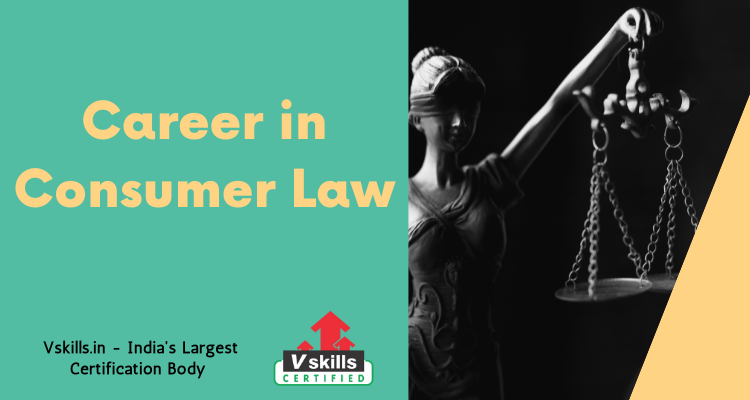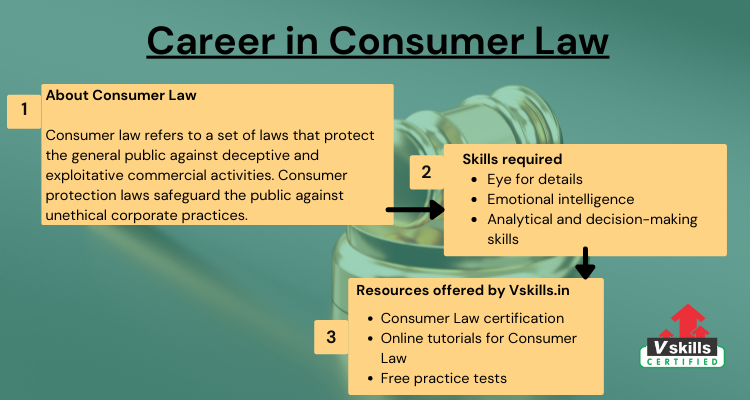Consumer law refers to a set of laws that protect the general public against deceptive and exploitative commercial activities. Consumer protection laws safeguard the public against unethical corporate practices.
Let us know about Career in Consumer Law!
About Consumer Lawyer
Consumer advocates help people with a wide range of concerns and needs. In general, a consumer advocate protects customers’ interests, safety, and values against deceptive tactics, unsafe products, and overcharging. A consumer advocate can help create arguments for consumer rights in court and initiate cases on behalf of affected customers; a consumer advocate can help shape legislation to safeguard consumer interests; and a consumer advocate can provide public information on goods and services. Advocates for consumers work in both the private and public sectors.
Roles and Responsibilities
The role of a consumer law professional in an organization is wide ranging and they deal with various issues. They advise on consumer credit which includes drafting credit agreements, acting in court proceedings and representations at hearings. Moreover, they provide advice concerning consumer contracts to see that organization comply with the relevant Acts with regards to standard terms and conditions. Additionally, they are responsible for dealing with designers, manufacturers, importers, retailers and consumers regarding product safety and liability. Diligence and high attention to work is required when working as a consumer law professional. High intellectual ability to absorb a wealth of information is preferred by employers while recruiting these professionals.
Eligibility
If you want to be a consumer advocate, one of the first things you should think about is how much knowledge you’ll need. A bachelor’s degree in law is held by 52.0 percent of consumer advocates, according to our research. In terms of higher education, we discovered that 5.2 percent of consumer advocates had a law master’s degree. Even though most consumer advocates have a college degree, anybody with a high school diploma or GED can become one.
Career Path for Consumer Law
Step 1: Earn a Bachelor’s Degree
Aspiring consumer advocates may select a major based on their preferred field of study. Advocates who want to fight predatory lending may major in business, accounting, or finance, for example. Civil justice may also be studied by consumer advocates to get experience in areas such as intellectual property and housing safety. Prospective consumer advocates could benefit from a political science major since it will help them grasp policy-making and government procedures.
Step 2: Gain Experience
Internships or volunteer opportunities with consumer advocacy organizations may assist aspiring consumer advocates decide which role they want to play in the advocacy process. Consumer advocate jobs include grassroots organizer, policy analyst, and outreach coordinator, to name a few. Consumer advocates may also conduct product safety testing or serve in administrative roles for charity and government groups.
Step 3: Consider Graduate or Professional Education
Many consumer advocates are simply required to have a bachelor’s degree. A higher degree, such as a Master of Science in Family and Consumer Science or a Master of Arts in Healthcare Consumer Advocacy, may be necessary for people pursuing work as legal advocates or seeking employment with the state or federal government. Some attorneys also serve as state consumer advocates; these positions need a Juris Doctor and legal licensing.
Step 4: Get Involved in Consumer Activism to Advance Your Career
Social, civic, and political groups hire consumer advocates. Volunteering is a good way for advocates who want to work for a nonprofit organization to start before progressing into paid jobs. Similarly, consumer advocates who want to work for the government at the state or federal level frequently obtain experience working for private groups before applying for government positions. Consumer advocates may work for the government to defend residents against unfair utility prices and practices, or to educate customers about predatory lending, credit reporting, insurance, and banking. Being as engaged as possible in your area of advocacy interest is crucial for professional success.
Salary Insights and Scope
Consumer Advocates earn a median annual pay of $29,099, or $14 per hour. The top ten percent earns more than $32,000 a year, while the poorest ten percent earn less than $26,000. A candidate with a Consumer Law degree has a wide range of employment options, which are expanding at a rapid rate. Consumer Law is a prominent law specialty that is in demand not just in the corporate sector but also in other disciplines. Anyone interested in Consumer Law has a multitude of options available to them. Below are some of the employment possibilities and career paths available in Consumer Law. One of the main reasons for this specialization’s popularity is because consumer law regulations change frequently and rapidly. Candidates have the option of continuing their studies in the same field.
Resources offered by Vskills for Career in Consumer Law
Vskills offer Consumer Law certification for all those interested in working in this field or in advancing their career. This certification course covers the following objectives –
- Consumer Acts
- Consumer Protection Councils
- Consumer Disputes Redressal Agencies
- District Forum
- State Commission
- National Commission
- Miscellaneous Matters
- Specimen Forms of Complaints, Appeals and Revision before consumer Redressal Fora
- Defenses to Consumer Complaints and Appeals
Vskills also offers free practice tests and online tutorials to supplement the learning process. You can check them by clicking on the following links –
Discover the career opportunities and other prospects of Career in Consumer Law. Hurry up and start preparing now with Vskills.in!




